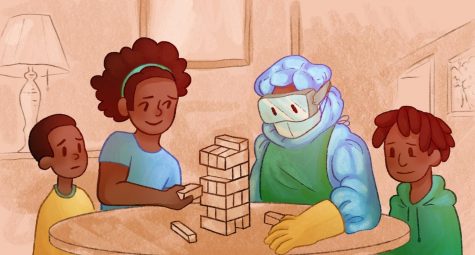Opinion: Health care workers need more than applause right now
April 10, 2020

Every night at 8 p.m., balconies and windows across Chicago light up. People hang their heads out windows, clapping and cheering; some sing and some play instruments. It has been dubbed “Solidarity at 8,” and it is the closest thing to a parade Chicago can give right now to celebrate its health care workers.
Such a salute is beyond warranted, as the coronavirus is overburdening the American health care system and the health care workers who are battling a global health pandemic from the frontlines. Hospital beds are full and ventilators are scarce, but an inordinate strain has also been placed on the doctors, nurses, administrators, janitors and every other arm of the health care field.
My mom is a health care worker in Michigan, the state with the third-highest number of cases after New York and New Jersey. She’s not a doctor or nurse—she works as a patient services representative—but nonetheless, the coronavirus, or COVID-19, pandemic has upended her life.
Since the small, local office she worked in is temporarily closed, she has been shuffled around to different offices and hospitals to fill in where she is needed. Every week, she works somewhere new, with different hours and different responsibilities.
Unfortunately, my mom’s experience is not unique, and my experience fearing for her well-being is not unique either. This story is not just my own. Knowing a number of my fellow Chronicle co-workers also have family in the medical field, I decided to speak with some of them to hear how they and their loved ones are working through this.
Staff Reporter Nick Forsythe’s mom is a nurse anesthetist who normally works at a non-emergency surgery center. Now, she works on an airway team—responsible for intubating coronavirus patients who need to use a ventilator—in an emergency room, also in Michigan.
Forsythe said he worries about his mother’s mental health more than her physical health these days. Having to adapt to a new work environment is difficult, but working during a pandemic can be especially emotionally taxing.
These fears are heightened when health care workers are members of at-risk groups for contracting the coronavirus.
Photojournalist Jacqueline Luttrell recently learned her daughter, a lead nurse, was exposed to the coronavirus. She said her daughter has lupus and is immunocompromised, and as a result has been laid off from her job so she can avoid further exposure.
“What we’re going through—this intensity—this is the whole country,” she said.
And if the stress of the job is not enough, health care workers also bring the coronavirus home to their loved ones—either the virus itself or the fear surrounding it.
Shane Tolentino, senior graphic designer, said it is the “elephant in the room” that her father could spread the coronavirus to the family. She said her father, an emergency room charge nurse, is needed now more than ever, but shortages of personal protective equipment have left him vulnerable.
The hospital where her father works has ceased testing emergency room staff for the coronavirus out of fear that many would test positive, Tolentino said. Those who test positive for the coronavirus are sent home, which means fewer staff to care for patients.
Supply shortages are also a problem for Staff Reporter Mateusz Janik’s brother, whose hospital ran out of N95 masks and started to reuse gowns. Janik said his brother, a nurse, is looking to change hospitals for one with more protective equipment available for staff.
“In his head, he’s more at the point of ‘I don’t want to not work’ … because that just puts it on all of the other people,” he said.
Across the board, health care workers have been put in a precarious position where they cannot protect others if they are not protected themselves.
“My mom is afraid that she’s going to go to work, get COVID-19 and die,” Forsythe said. “And there are some people who go to the beach.”
What health care workers need from us now is more than appreciation or acts of kindness. They need masks and gowns. From their employers, they deserve hazard pay for the sacrifices they have made. They need us to wash our hands, keep six feet of distance between ourselves and others and stay home whenever possible to stop the spread of this virus so their lives can return to some semblance of normalcy.
We ought to respect the wishes and cries for help from health care and other essential workers like our lives depend on it. Because they might.







